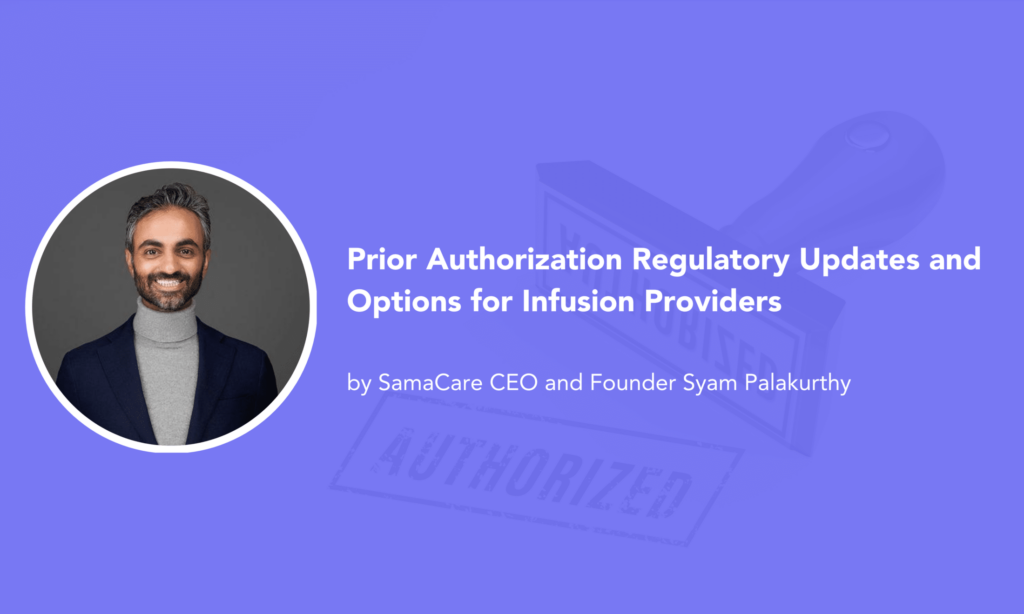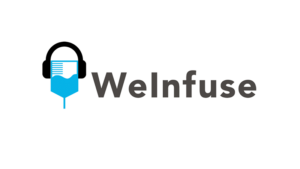SamaCare CEO and Founder Syam Palakurthy discusses how recent regulations leave out physician-administered drugs, but infusion providers still have options to simplify prior authorization.
As a technology provider in the prior authorization space, SamaCare has observed firsthand the impact of digitization on improving the prior authorization process, and the impact of streamlined prior authorization management on improving patient care at infusion centers. Recent regulations are a good first step to improving patient access to care and mitigating the negative impact of prior authorizations on both providers and patients, but they fail to address an entire category of treatment largely associated with infusion therapy.
What is prior authorization (PA)?
Prior authorization is a utilization management technique by which payers require that providers and pharmacies request advance approval for a specific course of treatment, service, or medication. The goal of prior authorization is to ensure that patients receive the most appropriate (and cost-efficient) treatment for their conditions.
Challenges with PAs
That said, however good the intention, prior authorization creates a substantial burden for providers, leads to delays in care, and has been proven to result in negative outcomes for patients.
Chief among the challenges with prior authorization, is that the process varies substantially by payer and plan both in terms of requirements and process for submitting a prior authorization. Inefficient process on both the provider and payer side often results in long wait times to receive prior authorization approval, preventable denials, and many hours spent on the phone troubleshooting avoidable issues such as whether or not a prior authorization request was even received by a payer and when a response can be expected.
Addressing the challenges
Recent regulations have endeavored to address some of these concerns as they relate to government plans by requiring payers to enable electronic submission of prior authorizations, establishing mandated ceilings on response times to a prior authorization, requiring payers provide a reason for denial on all denied PAs, and requiring more transparency by way of published payer benchmarks on prior authorization approval rates and resolution times. Specifically, after a lengthy process, the Centers for Medicare and Medicaid Services (CMS) announced a finalized rule to streamline prior authorizations for government provided plans in January.
Regulations that streamline government provided coverage set an important standard for the industry. Some healthcare providers are optimistic that commercial payers will follow suit on their own, while industry associations like the American Medical Group Association (AMGA) have also urged Congress to enact policy to expand CMS’ ruling to commercial plans.
This is a great first step, however, there are significant gaps in the existing rule. The ruling also does not apply to physician-administered medications – only medical items and services. This represents a notable gap in recent CMS reforms. While past regulations have required Medicare and Medicare Advantage Plans to provide electronic prior authorizations and set required response times for urgent and regular authorization requests for pharmacy benefits (Part D), no such regulations exist for Part B drugs, which include physician-administered infusion therapy both in the outpatient setting and home infusion. According to independent health research company KFF, 99% of Medicare Advantage Plans require prior authorization for these physician-administered drugs under medical benefits.
Why does this matter?
Delays in care associated with prior authorizations impact both patient experience and clinical outcomes. According to one article in the Journal of Managed Care & Specialty Pharmacy in 2023, prior authorization for specialty drugs can delay treatment by as much as 31 days. When treating patients with progressive diseases, these delays have a real impact on patient outcomes. A recent study by the American Medical Association (AMA) found that 33% of providers report PA has led to a “serious adverse event for a patient in their care.”
Additionally, the administrative cost of prior authorizations to providers continues to increase. A 2023 report by CAQH found the medical industry spent 30% more on prior authorization in 2023 compared to 2022 due to an increased volume of prior authorization submitted. The report found that prior authorizations remain one of the topmost time-consuming administrative tasks for providers, and most expensive on a per unit basis. However, electronic prior authorizations were found to reduce time spent by 50% compared to offline processes.
Wrapping it up: Providers, arm yourselves with the necessary PA tools
While infusion centers cannot rely on regulations to lessen the burden of prior authorization for physician-administered treatments – neither for government nor for commercial plans at this time – there are solutions that address the top challenges with prior authorization management.
For example, over 8,000 providers nationwide leverage SamaCare to unify prior authorization submission, tracking, and management across all payers and portal from one easy-to-use digital platform that integrates with top EHRs and infusion software like WeInfuse.
By unifying all prior authorizations digitally, providers are not only able to automate time – consuming manual parts of the prior authorization process, but they are also able to gain visibility into practice-wide benchmarks for prior authorizations that allow them to better communicate with payers, schedule treatment, and reduce inefficiencies – and unnecessary delays – associated with prior authorizations.
While SamaCare supports further regulations to improve access to care, it is also important for providers to arm themselves with the resources already available to fix the broken prior authorization process.
WeInfuse + SamaCare: A Strategic Partnership
WeInfuse, the premiere technology and consulting services for infusion therapy & medication delivery, and SamaCare are entered into a strategic partnership to streamline the prior auth process. Through this integration, WeInfuse clients have direct and free access to SamaCare’s prior authorizations software.
Guest Author: Syam Palakurthy is the CEO and Founder of SamaCare. SamaCare builds software to improve access to life-changing specialty medications by streamlining the prior authorization process.
_____________________________________
WeInfuse is dedicated to keeping infusion simplified and streamlining workflows for home infusion, specialty pharmacies, and infusion centers. WeInfuse software helps infusion operators operate efficiently, decrease burnout, maximize profits, and improve clinical outcomes.
For more infusion insights, tune into the WeInfuse podcast, download our magazine, and subscribe to our blog.




